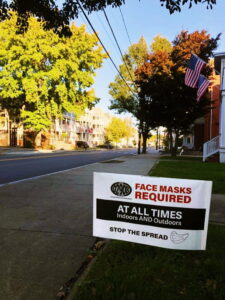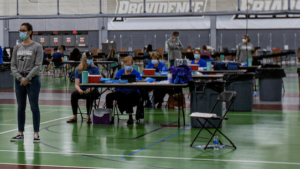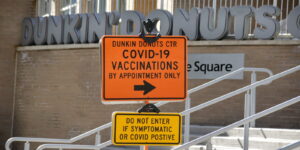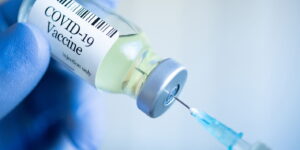Tag: vaccine
A Year for the Books: An Overview of COVID-19 at PC This Academic Year
by The Cowl Editor on May 6, 2021
Campus

by Hannah Langley ’21
News Co-Editor
Since the formation of this committee, PC students have become all too familiar with emails and text notifications for daily screenings, weekly testing schedules, and other updates.
An email from Dr. Sean Reid, provost and senior vice president for academic affairs, explained the mix of classes that would be offered going into the fall semester. The mix of in-person, hybrid, split, hy-flex, and remote classes gave faculty the ability to choose the way in which they wished to teach their classes. It also gave students who decided to remain remote and not return to campus greater flexibility.
Not long into the fall semester, a COVID-19 outbreak occurred. On Sept. 17, Fr. Sicard announced that the College would be shifting to “total remote learning at least through September 26” after over 80 students tested positive in the span of two days. On-campus students were directed to not leave campus, and stay-at-home orders were put in place for all off-campus students. By Sept. 19, the number of cases rose to about 138 positive students.
On Sept. 25, Fr. Sicard announced that remote instruction and stay-at-home directives for students would last until Oct. 3. Just a few days later, the date was extended to Oct. 8 for on-campus students and Oct. 12 for off-campus students.
The outbreak led to several initiatives by the College, including weekly testing for all students, consistent messaging about remaining in one’s pod, a restriction on any non-essential travel, and more. Rising cases in the state by November also caused Governor Gina Raimondo to make several announcements, restricting group gatherings to 10 and setting curfews.
Following winter break, students began to return with point-of-origin tests the week of Jan. 18. With classes resuming on Jan. 25, weekly COVID tests also resumed. Not long into the spring semester, though, a smaller COVID outbreak occurred. Students both on and off campus were sent to the Providence Marriott Downtown and Davis Hall to quarantine and isolate. The Continuity Task Force announced that PC had an approximately 2% positivity rate, leading to further restrictions from the President’s Office.
This second outbreak led to the decision to have students tested twice a week. For the remainder of the semester, students were asked to go for testing either Mondays and Wednesdays or Tuesdays and Thursdays, leaving Fridays for faculty and staff testing.
As cases began to decline, more and more restrictions and precautions began to ease. McPhail’s reopened on Thursdays, Fridays, and Saturdays for seniors. Attendance of outdoor games began to be permitted. Acceptable outdoor group gatherings increased to 50 people. Club sports were able to resume. An in-person commencement with two guests per graduate was approved to be held on May 20 on Hendricken Field.
Vaccines were also made eligible to all Rhode Island residents 16-years-old or over. Friars off campus began getting vaccinated towards the end of March, and the College held a vaccination clinic for all students, faculty, and staff on April 28.
Fr. Sicard reflected on the year by saying, “I think that one of the best decisions that we made was to reopen in person.” He continued, “During the first year of my presidency, I have been deeply moved by the commitment I have seen from our faculty, staff, and students. So many went above and beyond in caring for each other, in helping our students succeed, and in keeping each other safe and well.”
Ann Manchester-Molak, executive vice president, commented as well, saying, “In the 40+ years that I’ve worked here, I honestly can say that I have never experienced such a spirit of collegiality, involving so many faculty, staff, and students who joined together to somehow maneuver the highs and lows of a pandemic that has affected us all so acutely.” She commended the work of faculty, staff, and students who each did their part to persevere this academic year.
While masks are still required on campus, social distancing is still enforced, and students are still getting tested twice per week, there has been a significant change in COVID protocols since the fall semester began in August. Both Fr. Sicard and Manchester-Molak noted their excitement at the opportunity to have an in-person commencement for the class of 2021 to conclude the year.
The PC community has faced many trials and tribulations in dealing with COVID-19, but actions being taken and certain restrictions being eased show that there is a light at the end of the tunnel and a promising future for the next academic year. As Manchester-Molak stated, “Someday we will be able to look back at this year and realize that the goodness of ordinary people—doing extraordinary things—was all around us.”
Vaccinations at Friars’ Fingertips: Moderna Vaccines Arrive on PC Campus
by The Cowl Editor on May 6, 2021
Campus

Katherine Morrissey ’22
News Staff
Almost a week after vaccines became available to all students over the age of 16 in Rhode Island, the Providence College community was once again greeted with positive news regarding COVID-19 vaccinations. In addition to vaccination appointments continuing to be available in Providence at the Dunkin’ Donuts Center, vaccines would soon become accessible like never before for the Friar Family.
The news came through a series of emails sent to students, faculty, and members of the PC community from the Continuity Task Force during the weekend of April 25. These messages communicated that the Rhode Island Department of Health had announced it would offer a COVID-19 vaccination clinic for Providence College students, faculty, and staff at Peterson Recreation Center on Wednesday, April 28.
Students who wished to be vaccinated at the on-campus clinic were required to register in advance through the state’s scheduling portal. Despite the need for registration, the clinic located on campus provided a convenient opportunity to get vaccinated for students, faculty, and staff as Wednesday, April 28 was already a designated rest day.
The clinic operated from 10 a.m. to 6 p.m. in Peterson Recreation Center, offering those who wished to make appointments a large window on their day off to stop by and get vaccinated. The large gym, with the help of many devoted workers, was quickly transformed into a fully functional vaccination clinic. The gym, however, is no stranger to dramatic transformations as it has been the backdrop of many events throughout the years including everything from Black and White Ball to spin classes to, most recently, a COVID-19 testing center.
Those who got vaccinated at the on-campus clinic on April 28 received the Moderna vaccine, which requires a minimum of four weeks between doses. Those who are able to return to campus after the school year is over are encouraged to come back to Peterson on May 26 for their second dose. Individuals who cannot are encouraged to schedule their second doses of Moderna at home for on or around the same date. Those who have received both doses are then required to upload documentation to the College’s website.
After receiving their vaccine, students were given a Dunkin’ gift card and were entered into a raffle for the opportunity to win an Apple Watch. This provided extra incentive for all students to take a little time during their day off to get vaccinated.
The vaccination clinic was not open to all students, such as those who have already received the first dose of vaccines from different manufacturers like Pfizer, or students who were in quarantine or isolation for COVID-19. The clinic did not have significantly negative impacts on the schedules and routine of other students on their day off. The only change the PC community was forced to make was to their twice-a-week testing schedule.
While this change required students to test a day earlier and later than normal during the week, it also afforded them no testing on their day off. This quick and successful change demonstrated the school’s flexibility in executing the clinic as well as maintaining COVID-19 protocols already in place.
Vaccinations for students do not indicate an immediate end to the COVID-19 pandemic which continues to impact all our lives. However, Wednesday’s clinic marked a revolutionary step in the process of getting all members of the school community vaccinated.
Within the last year, many communities and groups of people have struggled to adapt and navigate the COVID-19 pandemic. This was widely seen across many college campuses as school communities had no choice but to be remote in order to keep students and faculty safe. Although many of us have been witnesses to the struggles and hardships of the last year, widespread vaccinations remind us of the triumphs of the human spirit and the many ways in which situations of necessity bring about the most impressive innovations.
Continued information about vaccination availability and registration will be provided to students through Continuity emails. The most up-to-date information is also provided on Providence College’s website and the state health department’s online portal.
Vaccinated Americans Get Breath of Fresh Air: Biden Removes Mask Mandate for COVID Vaccine Recipients
by The Cowl Editor on May 6, 2021
National and Global News
by Sydney Olinger ’23
News Staff
As of Tuesday, April 27, President Joseph Biden, alongside the CDC and Dr. Anthony Fauci, released new guidelines regarding the wearing of face masks. Biden addressed the immense progress America has made in reducing the number of COVID-19 cases and deaths by continuing to wear masks, social distancing, and now getting vaccinated. With full vaccination comes many new privileges, one of which is the freedom to not wear a face mask outdoors.
Experts have determined that wearing face masks throughout this pandemic has been one of the most effective ways of controlling virus transmission.
This new mandate has been up for debate for a few months; however, since the release of the vaccine. Because many people are now getting the vaccine and most COVID-19 transmission occurs indoors, it was finally decided that a fully vaccinated person does not have to wear a mask outdoors. These new perks of not having to wear a mask in certain places will hopefully be an incentive for every person to get out and get vaccinated.
“So, for those who haven’t gotten their vaccination, especially if you’re younger or thinking you don’t need it, this is another great reason to go get vaccinated,” Biden said. People are considered fully vaccinated by the CDC two weeks after the second dose of the Pfizer/BioNTech or Moderna vaccines or two weeks after the single-dose Johnson & Johnson vaccine.
Unfortunately, though the vaccine certainly makes it much less likely that vaccinated people will test positive for COVID-19 or experience symptoms, there is still a small chance that a vaccinated person could carry the virus and possibly transfer it to an unvaccinated person. It is also important that those who received the Moderna or Pfizer/BioNTech vaccines remain especially cautious, wear a mask, and socially distance before their second dose.
Coronavirus cases have decreased by 16 percent in just the last week as the amount of people in the U.S. who have received the first dose of the vaccine surpassed 140 million people. This means that 32 percent of the population is now fully vaccinated, with 44 percent having received one dose of the two-shot vaccine. Despite the high numbers of vaccinated citizens, many more will need to receive the vaccine before the country can return to normal life.
There has been hesitancy surrounding the vaccine, mainly as a result of fear of possible long-term effects. However, the vaccines were developed over a fairly long period of time, ruling out the majority of possible risks. Moreover, as of right now, there have been very few extreme negative reactions to the vaccines. It is important that we trust the experts and health professionals who worked diligently to find the most effective way to prevent the spread of the virus that we have faced for over a year now.
Vaccine Rollout Starts Spring-ing Into Action: April Brings Increased COVID Vaccinations for Friars, Rhode Islanders
by The Cowl Editor on April 22, 2021
Campus

by Katherine Morrissey ’22
News Staff
After enduring the COVID-19 pandemic for over a year, the Friar Family and residents of Rhode Island can breathe a sigh of relief with vaccination eligibility expanding in the state of Rhode Island.
The happy news was communicated to Providence College students Thursday evening through a series of emails from the Continuity Task Force. Within the emails, students were told that all students 16 years or older now qualify to be vaccinated in the state of Rhode Island. This marks a monumental step for not only the state, but also the PC community, as all students are now eligible to be vaccinated.
The last year has tested the strength of this community, country, and the human spirit globally. Starting last March, students, faculty, and family watched as every sense of normality was turned on its head. The PC community lamented as classes went completely remote, study abroad programs and graduation were canceled, and everyone frantically grew acquainted with a new normal: a world of social distancing, Zoom classes, masks, weekly testing, and constant fear for others’ wellbeing.
At points over the last year, it seemed vaccination was far out of reach, specifically for students who attend college outside of their home state. However, with this news, students studying in Rhode Island can obtain their vaccines without having to travel home.
Late last week, students who were eligible could register to receive their vaccines on Saturday, April 17, at the Dunkin’ Donuts Center from 9 a.m. to 7 p.m. The College offered transportation services to the Dunk, which made arriving for appointments more convenient.
Walking through the center and entering the stadium for the first time since last March was truly surreal. The familiar basketball court had been transformed into a fully-functioning vaccination clinic. While this new image did not match the memories of March Madness games and the John Legend concert, students found themselves in awe of how far the world has come in just over a year.
Continued information about vaccination registration and access is being communicated to students through emails via the Continuity Task Force. However, the most up-to-date information is also provided on the College’s website and the state health department’s online portal.
Vaccination appointments are given on a first-come, first-served basis. To register for a vaccination appointment, students can call 211, which is staffed from 8 a.m. to 8 p.m., and ask for information about equity-focused vaccination clinics.
Rhode Island Recovery Effort Experiences Growing Pains: Citizens Become Frustrated With Vaccine Dispersal
by The Cowl Editor on February 25, 2021
Campus

by Max Waite ’21
News Staff
As of Feb. 22, eligibility for the COVID-19 vaccine has expanded in Rhode Island to those who are 65 and older. Though this age group is now eligible, it has already proven to be difficult to book vaccination appointments at various testing centers and pharmacies like CVS and Walgreens. Appointments are quickly being booked extending into the immediate future as more groups are becoming eligible for the vaccine, and citizens have expressed their frustrations with the online format’s technical issues.
Approximately 9,900 citizens were vaccinated across both state-run testing facilities during the first three days of operation. Over the past six weeks, the vaccine administration rate has increased by 89 percent in Rhode Island, with more than 211,000 doses of the COVID-19 vaccine having been administered to date.
Overall, the state has seen a steady decline in new cases and hospitalizations. Field hospitals in Providence and Cranston will be taken out of service, as Rhode Island has seen a 47 percent decline in hospital admissions since last month. The Rhode Island Convention Center will have its last day of patient care on Friday, Feb. 26, and Cranston’s site is scheduled to shut down within the next couple of weeks. On another note, Rhode Island has placed New Hampshire back on the state travel advisory list, along with Louisiana.
In the past seven days, Rhode Island reported the most COVID-19 deaths as a percentage of its population in the country. For the past year, the state has had the fourth-highest COVID-19 death rate in the country, behind New York, New Jersey, and Massachusetts. Six percent of the population in Rhode Island has been fully vaccinated.
For Providence College students, the routine of weekly testing remains the same. Over the past week, the number of positive test results at the PC testing center has significantly declined. On Feb. 18, Rhode Island reported a 1.72 percent COVID-19 positivity rate, with an average of 2.2 percent over the course of that week. Though eligibility for vaccinations is expanding across the state, the College continues to urge students to remain conscientious of social distancing guidelines, having students remain in their pods and encouraging them to only leave for essential purposes. There have been concerns regarding the continuation of large gatherings off campus, and if the positive numbers increase significantly again, there may be trouble ahead in Friartown. In the meantime, as vaccination efforts continue to progress, it is best for everyone to continue to do whatever they can to stop the spread of the virus.
Helping to Turn the Tide: First COVID-19 Vaccinations Flood Ocean State
by The Cowl Editor on February 4, 2021
Campus

by Eileen Cooney ’23
News Staff
On Feb. 1, Rhode Island reported a 2.7 percent COVID-19 positivity rate, its lowest since October, with 158 new cases and 13 fatalities. The decrease in the positivity rate is due to a combination of factors, but many health officials are pointing to the nearly 77,000 first doses of the vaccine that have been administered so far, and the 28,000 people in Rhode Island who have been fully vaccinated.
Rhode Island, like all states currently, is seeking to ramp up its vaccination efforts in hopes of stemming the winter surge and combatting new variants of the virus that are causing alarm.
On Jan. 28, state health officials announced the next phases of the state’s vaccination plan, which allows those who are 65 and older to be vaccinated starting in mid-February. As of now, there are only limited vaccinations available for those above the age of 75. Rhode Island first made vaccinations available to health-care workers, first responders, and nursing home and assisted living facility residents and staff.
Dr. Nicole Alexander-Scott, Rhode Island’s Department of Health director, has said that the next upcoming phase will involve all Rhode Islanders over the age of 16 who have underlying health conditions, are immunocompromised, or are pregnant. This next phase is also unique in that it would involve distributing vaccines at a quicker pace in those towns where there are a disproportionate number of hospitalizations due to the virus, Alexander-Scott has said in press conferences.
She states that, currently, the state is dealing with a limited supply of the vaccine, but that “the aims of this next phase are to protect those most at risk for hospitalizations and death from COVID-19.”
In neighboring states like Massachusetts, the vaccine roll-out has not been as well-received by residents. Massachusetts Senator Eric Lesser said on Jan. 28 that “the Phase 2 vaccine rollout is creating mass confusion and anxiety for our eligible senior population. The system is cumbersome, contradictory, and asks residents over 75 to navigate a haze of web links, locations, and instructions, each with different criteria and scheduling systems.” In response to criticism, Massachusetts Governor Charlie Baker urged all to be patient with the process until a steadier, more stable supply of doses is obtained from the federal government. The governor also said that his administration was working to create more resources to help those who are older and having difficulty trying to navigate the sign-up process.
News of increased vaccinations offers Rhode Islanders and those in neighboring states slight glimmers of hope during what has been a disastrous winter for the state and the country as a whole. New coronavirus variants that were first identified in South Africa and the United Kingdom have been found to be more contagious, and now there is preliminary evidence suggesting they could even increase mortality. On Jan. 29, Johnson & Johnson released data revealing that their one-dose vaccine is 66 percent effective against moderate and severe disease, but this hopeful measure was overshadowed by other data, suggesting the vaccine could be less effective against these new variants. Shares of Johnson & Johnson fell on Friday as investors were hoping for an efficacy number above 80 percent. In response to this pessimism among some, John Brooks, a chief medical officer at the CDC, said that “any vaccine is better than no vaccine.”
In the meantime, Providence College students find themselves going through the motions of weekly testing and social distancing measures following their return to campus for the spring semester. After observing an initial “quiet period” in which students were required to stay in their on or off-campus housing locations, with exceptions given for traveling to class and work, shopping for groceries and receiving grab-and-go meals from Raymond Dining Hall, and participating in outdoor exercise with a student’s own pod, the hope amongst many students is that recent developments on the vaccine front will help alleviate stress and restrictions on the PC community. Time will tell just how successful these recent vaccination efforts have been.
